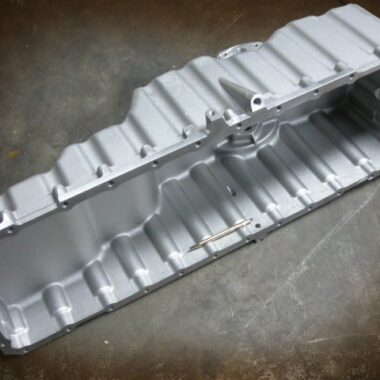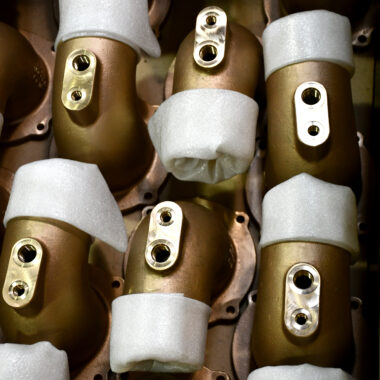Accomplish Excellence: Advanced Techniques in Casting Aluminum
Accomplish Excellence: Advanced Techniques in Casting Aluminum
Blog Article
The Definitive Manual on Light Weight Aluminum Spreading Solutions
Within the detailed world of aluminum spreading services lies a wealth of knowledge waiting to be discovered. As industries continue to require accuracy and high quality, understanding the subtleties of aluminum casting processes becomes vital. From the crucial tools and devices to the important element of top quality control, every detail plays a significant duty fit the last end result. What absolutely establishes an extensive manual apart is its capability to not just offer foundational expertise yet likewise to use insights into making best use of performance and performance. As we browse with this definitive handbook, revealing market trends and developments that shape the landscape of aluminum casting services, we are advised of the limitless possibilities that await those ready to submerse themselves in this elaborate craft.

Recognizing Light Weight Aluminum Spreading Procedures
Discovering the details of light weight aluminum spreading procedures discloses the accuracy and intricacy entailed in changing liquified steel into intricate components. Light weight aluminum casting is a meticulous production method that involves the pouring of liquified light weight aluminum right into a mold and mildew to produce a desired shape.
Throughout the cooling procedure, the aluminum takes the shape and strengthens of the mold. What follows is thorough craftsmanship to eliminate any type of imperfections and improve the part to meet the required specifications. This process demands an eager eye for detail and a deep understanding of metallurgy to make certain the end product's high quality and integrity.
Recognizing the nuances of aluminum casting procedures is crucial for producing top quality parts that satisfy market requirements and requirements. From aerospace to automotive sectors, the accuracy of aluminum spreading plays a vital duty in producing reputable and sturdy components.
Necessary Devices and Equipment
What devices and tools are indispensable for attaining accuracy and efficiency in aluminum spreading processes? To ensure effective aluminum casting, numerous crucial devices and tools are required. Crucible furnaces play an important duty in melting the light weight aluminum alloys, giving the liquified metal required for spreading. Crucibles made of materials like clay graphite or silicon carbide are frequently utilized as a result of their high heat resistance. Additionally, a ladle is necessary for transferring the liquified metal from the heating system to the molds accurately. Air flow systems are critical to remove any type of fumes or gases generated during the spreading process, making certain a safe workplace. Molds, made from materials such as sand or steel, are needed to form the liquified steel right into the preferred type. Other devices like tongs, putting basins, and cooling down chambers are additionally important for managing the liquified steel and making sure correct solidification. By utilizing these devices and equipment efficiently, light weight aluminum spreading services can accomplish high accuracy and performance in their procedures.
Quality Assurance in Light Weight Aluminum Casting
Ensuring consistent quality standards is extremely important in aluminum casting processes to satisfy industry requirements and client assumptions. Quality control in aluminum spreading includes an organized technique to monitoring and evaluating every stage of the spreading process to guarantee the end product's stability. To attain this, different methods are utilized, such as visual inspections, dimensional checks, non-destructive screening, and product analysis. Visual examinations are carried out to determine surface flaws like splits, porosity, or insufficient fills. Dimensional checks ensure that the casting meets specific specs. Non-destructive screening techniques like X-ray, ultrasonic, or dye penetrant evaluations can find interior imperfections without harming the component. Material analysis through spectroscopy or chemical screening validates the composition of the aluminum alloy made use of (casting aluminum). By applying strict quality assurance actions, aluminum casting provider can deliver parts that stick to the greatest requirements of efficiency, quality, and integrity, inevitably pleasing both industry guidelines and consumer demands.

Taking Full Advantage Of Effectiveness and Efficiency
To enhance functional performance in aluminum spreading solutions, maximizing efficiency and productivity is crucial for meeting manufacturing needs and keeping advice competitive benefit in the market. Applying lean manufacturing principles, such as decreasing waste and improving processes, can considerably improve overall effectiveness. Making use of innovative innovation, like computer-aided layout (CAD) software and automated systems, can improve performance by lowering manual work and enhancing accuracy.

Working together closely with vendors to make certain a steady flow of high-quality materials and executing durable scheduling and stock administration systems are additionally essential strategies for making best use of efficiency in aluminum casting services. By concentrating on these locations, firms can accomplish higher degrees of efficiency, fulfill customer needs successfully, and stay in advance in an open market.
Sector Fads and Advancements
In feedback to the progressing landscape of aluminum spreading services, remaining abreast of sector fads and developments is imperative for preserving an one-upmanship and satisfying the dynamic demands of the market. One noteworthy fad in the aluminum casting sector is the boosting concentrate on sustainability and ecological responsibility. Companies are adopting greener practices, such as making use of recycled aluminum and executing energy-efficient procedures, to straighten with customer expectations and governing demands.
Furthermore, developments in modern technology are changing light weight aluminum casting procedures. The integration of automation, robotics, and synthetic knowledge is improving manufacturing, boosting precision, and minimizing lead times. 3D printing is additionally making waves in the market by enabling intricate geometries to be generated with higher effectiveness and cost-effectiveness.
Additionally, there is an expanding focus on customization and product personalization. With consumers seeking unique and customized products, aluminum spreading services are adjusting to provide more flexible manufacturing remedies. By embracing these industry patterns and you can find out more innovations, companies can place themselves for success in a swiftly developing market.
Final Thought
Finally, the manual on aluminum spreading solutions provides a comprehensive review of the processes, devices, quality assurance procedures, efficiency methods, and market fads in the field. By recognizing these essential facets, companies can boost their spreading procedures, make certain high-grade products, and stay competitive out there. This conclusive manual acts as a useful source for those involved in aluminum casting services.
As industries proceed to demand precision and top quality, comprehending the subtleties of aluminum spreading procedures ends up being vital (casting aluminum). Light weight aluminum spreading is a meticulous production method that involves the putting of liquified light weight aluminum right into a mold and mildew to develop a desired form.Guaranteeing constant high quality criteria is vital in aluminum spreading processes to meet sector demands and client expectations. Quality control in light weight aluminum casting entails a systematic approach to tracking and evaluating every stage of the spreading process to ensure the last product's more helpful hints honesty.In verdict, the handbook on light weight aluminum spreading solutions gives an extensive overview of the procedures, tools, quality control procedures, performance approaches, and industry trends in the area
Report this page